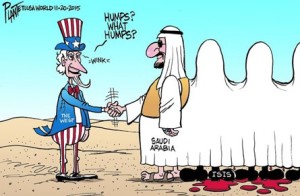
18 April 2016 – So the great, long-awaited counterattack against ISIS has finally begun. The offensive that spans Syria and western Iraq is targeting the ISIS-held cities of Raqqa and Mosul, Iraq’s second largest city. Moving with all the speed of a medieval army of drunken foot soldiers. I find the spectacle both pathetic and weird.
But as I have noted before: living in a world seemingly corralled by algorithms, when I travel to the Middle East I must bring to my soul an element of chaos to a culture that continually plays its deadly, dystopic sameness and Byzantine complexity.
In the west, the Syrian government and Kurdish troops … stiffened by US, British and French special forces, and backed by US close air support … inch their way to ISIS-controlled Raqqa. Syrian troops just retook Palmyra, Hardly a second Stalingrad. As U.S. intelligence reported …. as did most of the Middle East press .. the ISIS fighters piled into their pickups and skedaddled.
Mosul is the more important target. It is the gateway to Iraq’s northern oilfields. Arabs and Kurds have been battling over Mosul for decades. Iraq’s Kurds, now allied to the US, are set on cementing their hold on Mosul and its oil-producing region…and probably expelling many of its Arab inhabitants. The Turks, who once ruled this region, are angry as hornets and fearful that an independent Kurdish state may be proclaimed at Mosul.
Bobby Fisk, a long-time Middle East analyst I befriended some years ago, noted over the weekend:
To get to Mosul, all the US-led forces need do is start their vehicles and drive a few hours up the highway to that city. Iraq has excellent roads thanks to its murdered president, Saddam Hussein. US-led Iraqi government and Kurdish forces are similarly close to Mosul from their bases in western Iraq.
If Germans or Russians were running this mini-war, they would have taken Mosul last year.
Chat with folks “in the know” and you get a similar refrain: the dreaded ISIS is little more than a bunch of 20-something kids without any military training or professional command except for some veterans of Saddam’s disbanded army. It has almost no artillery and only light anti-aircraft guns. Their supplies are scanty; their communications listened into by nearly everyone. US, British, French, warplanes buzz overhead, ready to blast anything that moves in the flat, empty desert terrain. The tiny Russian air contingent in Syria has proven far more effective than the US and its allies. The mighty US Air Force has continued pinprick attacks on ISIS positions in what has become a pantomime war. It’s almost as if the western powers are playing make-believe in Syria. The notion that a rabble of 20-something ISIS kids can stand up to highly trained heavily armed western troops and their native auxiliaries is absurd.
Why? Let us return to Byzantine.
The Saudis and Turks, both very close US allies, have been arming and supplying ISIS in order to topple the Damascus-based Shia regime of President Bashar Assad. Washington has gone along with this covert fight while lamenting the terrors of “terrorism”. Washington’s strategy in Syria has become so comically inept that the Pentagon and CIA are actually backing rival Syrian jihadist groups who are fighting with one another. The Russians are mocking Washington. Who can blame them.
The Obama administration is clearly reluctant to use “force majeure” against ISIS. So it continues to tip-toe and lilly-dip in Syria and Iraq, likely assuring that the US will eventually get stuck in another big Mideast conflict.
U.S. military intervention has been a calamity in the Middle East. They have destroyed Iraq, destabilized Libya, fostered dictatorship in Egypt, accelerated civil war in Syria, and the destruction of Yemen, and helped squelch a pro-democracy movement in Bahrain.
While focusing on the ‘failure’ of American foreign policy in the Middle East it is relevant to acknowledge that given the circumstances of the region, failure to some degree was probably unavoidable. My argument is that the degree and form of failure reflected avoidable choices that could and should have been corrected, or at least mitigated over time.
It is also true that the Middle East is a region of great complexity reflecting overlapping contradictory features at all levels of political organization, especially the interplay of ethnic, tribal, and religious tensions internal to states as intensified by regional and geopolitical actors pursuing antagonistic policy agendas – made worse by the emergence of non-state actors and movements that give primary legitimacy to Islamic affinities while withdrawing legitimacy from the modern state as it took shape in Western Europe.
More to come.